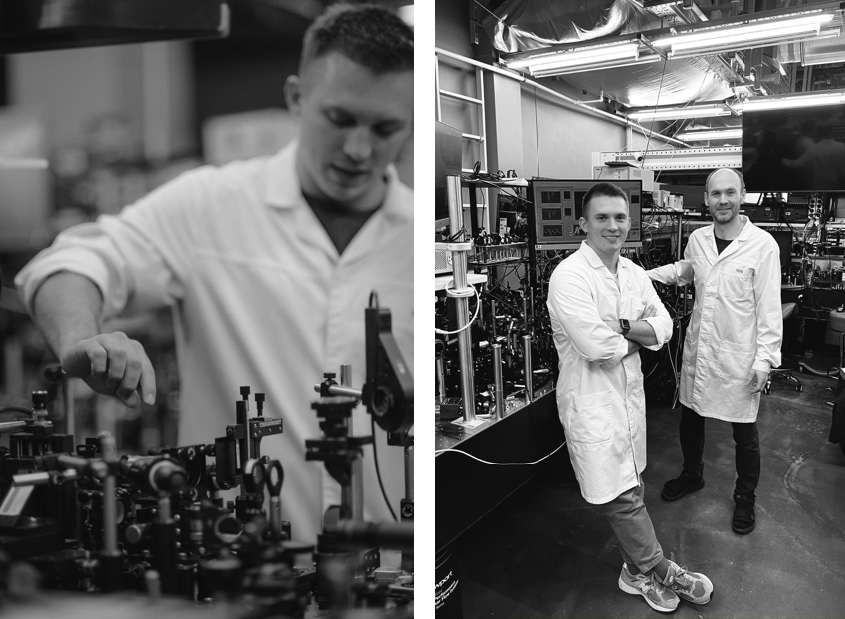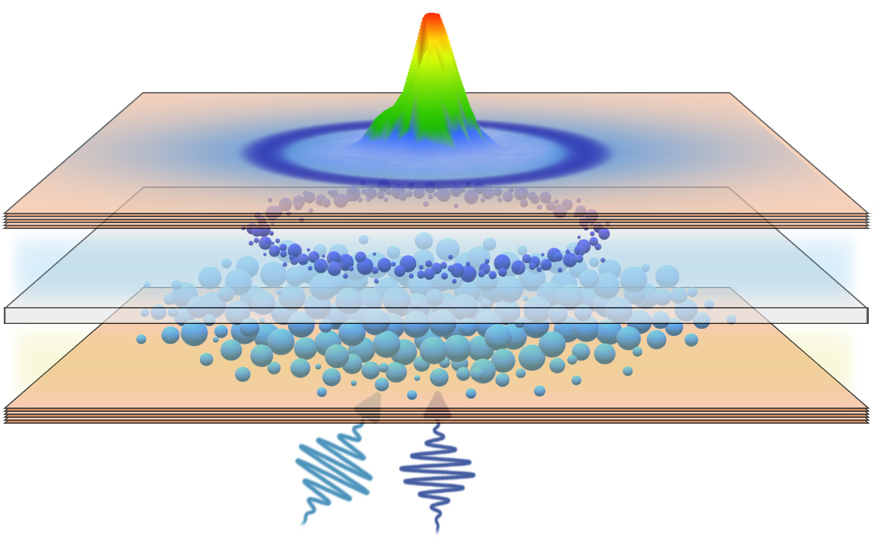In a quantum leap toward the future of unconventional computing technologies, a team of physicists made a groundbreaking advancement in spatial manipulation and energy control of room-temperature quantum fluids of light, aka polariton condensates, marking a pivotal milestone for the development of high-speed, all-optical polariton logic devices that have long held the key to next-generation unconventional computing, according to a recently published paper in Physical Review Letters.
Polaritons, hybrid particles formed by the coupling of light and matter, are usually described as a quantum fluid of light that one can control through its matter component. Now, researchers have taken a monumental step forward by introducing a novel approach for active spatial control of liquid light condensates at room temperature.
Schematic of a double-dye organic microcavity with two-color excitation profiles creating a polariton condensate in the center of a ring shape. Anton Putintsev et al./Physical Review Letters
What sets this development apart is the ability to manipulate polariton condensates without relying on the commonly utilized excitation profiles of polaritons. The scientists accomplished this feat by introducing an additional layer of copolymer within the cavity — a weakly coupled layer that remains nonresonant to the cavity mode. This seemingly simple yet incredibly ingenious move has opened the door to a wealth of possibilities.
By partially saturating the optical absorption in this uncoupled semiconductor layer using a two-color beam excitation, the researchers have enabled ultrafast modulation of the effective refractive index simultaneously with the formation of a polariton condensate. Through the marvel of excited-state absorption, they have unlocked the secrets of locally induced polariton dissipation. The intricate interplay of these mechanisms, like pieces of a beautifully designed puzzle, has given rise to unparalleled control over the spatial profile, density, and energy of a polariton condensate — all at room temperature.
“This breakthrough ushers in a new era of the organic polariton platforms designed to build a strong foundation for the field of liquid light computing at ambient conditions. By taming fascinating properties of strong light-matter interactions, we can harness the full potential of polaritons and break free from the constraints of traditional cavity architectures. We are witnessing the future of technology unfold before our very eyes,” says Anton Putintsev, a research scientist at Skoltech’s Laboratory of Hybrid Photonics and the driving mind behind this work.

Study co-authors Research Scientist Anton Putintsev (left) and Deputy Head of Laboratory Denis Sannikov at the Laboratory of Hybrid Photonics, Skoltech. Credit: Ruslan Khafizov
With this development, scientists now have the power to design all-optical polariton logic devices that harness the benefits of ultrafast microcavity refractive index modulation as another independent, real-time tuning parameter. It also enables the integration of such weakly coupled absorbers in microcavities of a lateral design that have been recently proposed to bring polariton platforms into the plane of a photonic chip circuitry domain.
In a world driven by technological innovation, this breakthrough represents a giant leap forward. The tantalizing prospect of high-speed, all-optical polariton logic devices has sent shockwaves through the scientific community, leaving us eagerly anticipating the incredible possibilities that lie ahead.
The research reported in this story was supported by the Russian Science Foundation Grant No. 23-72-00059.
Contact information:
Skoltech Communications
+7 (495) 280 14 81

